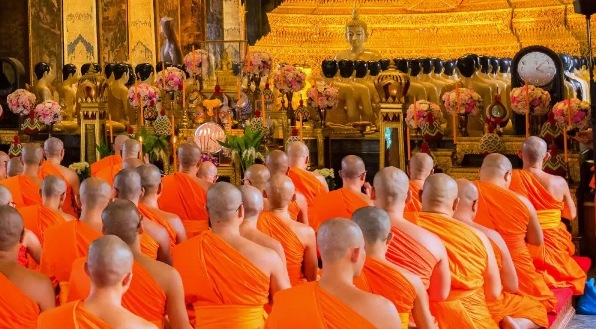End of Vassa, a Day of Atonement and Renewal in Theravada Buddhism
 In the world of Theravada Buddhism, a solemn and reflective period known as Vassa marks a three-month annual retreat observed by devout practitioners. This sacred tradition unfolds during the wet season, spanning from July to October. As the end of Vassa approaches, Buddhists prepare to mark a significant day known as Pavarana Day, which carries the purpose of atonement and renewal.
In the world of Theravada Buddhism, a solemn and reflective period known as Vassa marks a three-month annual retreat observed by devout practitioners. This sacred tradition unfolds during the wet season, spanning from July to October. As the end of Vassa approaches, Buddhists prepare to mark a significant day known as Pavarana Day, which carries the purpose of atonement and renewal.
Vassa, also known as "Buddhist Lent," is a time when Theravada monks dedicate themselves to spiritual growth and self-discipline. It is a period of profound meditation and commitment to ascetic practices, such as abstaining from meat, alcohol, or smoking. In Thailand, the sale of alcohol is even prohibited on the first and last days of Vassa. This annual retreat holds immense significance in the lives of Theravada Buddhists and symbolizes a period of self-improvement and spiritual deepening.
This year, the conclusion of the Buddhist lent is set for October 29, bringing anticipation and reflection among the faithful. To understand the origins and the significance of the day marking the end of Vassa, it's essential to delve into the rich history and practices associated with this period.
Origins of Vassa
Vassa's roots trace back to ancient India, the birthplace of Buddhism, where the rainy season lasts for three months. During the time of the Buddha, a group of wandering monks faced a dilemma. Seeking shelter to avoid trampling the villagers' plants, they decided to cohabitate in a residence. However, this arrangement had the potential for interpersonal conflicts.
In an effort to minimize strife, the monks made a remarkable agreement – they would remain silent throughout the entire three-month rainy season. This silence was accompanied by non-verbal means of sharing alms. When the Buddha learned of this practice, he instituted the Pavarana Ceremony. This ceremony aimed to address and resolve conflicts and breaches of disciplinary rules that might arise during the Vassa season.
Practices on Pavarana Day
Pavarana Day, also known as the end of Vassa, holds a significant place in Theravada Buddhism. It is a day of atonement, renewal, and deep reflection. Devout Buddhists are encouraged to engage in a set of practices to mark this special occasion:
* Perform Acts of Merit: One of the central practices involves offering alms and dedicating merit to deceased relatives. It is a way to pay respect to ancestors and seek their blessings.
* Listen to Dharma Teachings: Devotees listen to Dharma teachings, observe precepts, make offerings, and participate in Dharma sermons. This deepens their understanding of Buddhist teachings.
* Offer Alms to Monks: In celebration of the descent from heaven by Lord Buddha, offerings are made to the monastic community. This act symbolizes gratitude and reverence.
* Clean and Decorate: Homes, public buildings, and significant Buddhist places are cleaned and decorated. This includes the hanging of national and Buddhist flags, signifying a sense of unity and reverence.
* Organize Educational Activities: Exhibitions, lectures, and discussions related to the day are organized at government offices, educational institutions, and temples. These activities aim to disseminate knowledge to the public and interested individuals.
* Ascetic Practices: Devotees are encouraged to avoid entertainment, engage in fasting, and abstain from harming or consuming animal flesh. These practices promote self-discipline and spiritual growth.
As Theravada Buddhists around the world prepare to mark the end of Vassa on October 29, these practices hold deep significance. Pavarana Day serves as a reminder of the commitment to self-improvement, atonement, and the pursuit of spiritual enlightenment. It is a day to renew one's dedication to the path of Buddhism, offering a chance for reflection and growth.
The Buddhist Channel
Source: buddhistchannel.tv
